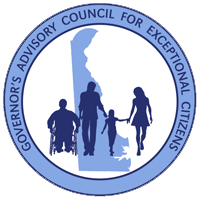Welcome,
This section was designed for all parents of children with disabilities. The goal of this section is to give you information, resources and things to think about as you raise your child to adulthood. We hope to make your job as a parent easier by providing helpful transition information that supports your young adults future success. You will find checklists, information about the transition process, IEP requirements and information for military families in this section.
Please encourage your teen to explore Deldhub on their own for it is a place they can learn about the many aspects of life facing them as they transition into adulthood.
FREQUENTLY ASKED QUESTIONS
Students with disabilities may be eligible for school and district testing accommodations, as well as accommodations on the state assessment. Unless a student’s IEP team determines that a given assessment is not appropriate for the student, IDEA allows children with disabilities to participate in statewide assessments with accommodations, (in Delaware, the state assessment is Smarter Balanced).
Accommodations in both the classroom setting and in statewide assessments settings tend to fall into several types of categories, including but not limited to: Presentation, Setting, Response, and Timing/Scheduling.
Accommodations may be available for students taking the SAT/ACT, Subject Tests, PSAT or AP exams. Accommodations must be pre-approved by The College Board, which considers all reasonable requests for accommodations needed by students with disabilities.
Download a fact sheet from Parent Information Center (PIC) for additional information.
There were changes to my child's IEP, should I have a Prior Written Notice?Once the school district has decided what action it’s proposing or refusing to take, it must (in a reasonable time before it will take that action), provide the parents with prior written notice. The school district must provide written notice regarding the following kinds of actions, or refusal to take one of these actions:
- Evaluation or reevaluation of the child;
- Identification of the child as a child with a disability;
- The educational placement of the child; and
- The provision of a free appropriate public education (FAPE), including special education and related services, which would include the content of the individualized education program (IEP) for the child.
Transition planning should be in effect when a student turns 14 or enter the Grade 8, or younger if deemed appropriate by the IEP team. Students with disabilities and their families must be offered transition planning as part of their Individualized Education Program (IEP) process. Transition planning prepares students for their future after high school and through adulthood. Transition planning focuses on allowing students with disabilities and their families to create their own goals and provides plans for achievement.
Transition planning in the IEP process focuses on employment, post-secondary education or training, community participation and independent living. The IEP team should include the student as a part of the transition planning process. Also, agency representatives who may provide and/or pay for transition services become critical members of the planning team as well.
What is DVR (Division of Vocational Rehabilitation Services) and who is eligible?If you have a disability you may qualify for DVR services if the disability presents an obstacle to obtaining or maintaining employment, and you are capable of being employed with the help of services provided by DVR.
DVR offers various services which may include assessment, counseling and guidance, information and referral, physical/mental restoration services, rehabilitation technology, skill training, job placement assistance, interpreter services, supported employment services, as well as others.
How can I get started with DVR (Division of Vocational Rehabilitation)?You can refer yourself for services by calling any local DVR office and providing some basic information. A referral to DVR can also be made through other sources, such as school counselors, community rehabilitation programs, physicians, psychologists or psychologists.
What questions can I ask to make sure my child's transition goals are effective?- Is there a measurable postsecondary goal or goals for the student?
- Can the goal(s) be counted?
- Does the goal(s) occur after the student graduates from school?
- Are the postsecondary goals based on an age-appropriate transition assessment?
- Are there annual IEP goals that reasonably enable the child to meet the postsecondary goal(s) or make progress toward meeting the goal(s)?
- Are there transition services (including courses of study) in the IEP that focus on improving the academic and functional achievement of the child to facilitate his or her movement from school to post-school?
- Do the transition services listed in the IEP relate to a type of instruction, related service, community experience, development of employment and other post-school adult living objectives (and, if appropriate, acquisition of daily living skills), and provision of a functional vocational evaluation?
- Are representatives of other agencies invited (with parent consent or the student’s) to IEP meetings when transition services are being discussed that are likely to be provided or paid for by these other agencies?
A person of the age of 18 years or older on June 16, 1972, and any person who attains the age of 18 years thereafter, shall be deemed to be of full legal age for all purposes whatsoever and shall have the same duties, liabilities, responsibilities, rights and legal capacity as persons heretofore acquired at 21 years of age unless otherwise provided.
Additional ResourcesA guardian is a person who makes decisions for someone who cannot make decisions for themselves. The appointment of a guardian is a court proceeding. Jurisdiction over guardianship cases is retained by the Delaware Court of Chancery.
What are the different types of Guardians?There are two different types of guardianships for adults with disabilities.
A guardian of property has the authority to make decisions involving financial or property matters. These guardians control property interests, including essentially anything that can be the subject of ownership. The court has the same powers over the estate as the individual with a disability did before the onset of the incapacity, except for the power to make a will. The court may limit which rights to allow the guardian to exercise. A guardian of the property may be able to do such things as invest or reinvest personal property, sell stocks, and pay taxes.
A guardian of the person can make decisions controlling the care of the individual with a disability. A guardianship of the person is one affecting personal interests, custody and care, such as where the individual with a disability lives, the ability to consent to services, education, medical treatment, and the release of confidential information. The court/guardian has the same control over the person with a disability under this type of guardianship as a parent would.
A separate guardian may be appointed for an individual with a disability’s person and for the property, or one may be appointed for both. It is important to note that both types of guardians are explicitly protected by statute from spending their own money for the support or care of the disabled person.
When should adults have a Guardian appointed for them?Adults with mental or physical disabilities can have guardians appointed if due to a mental or physical disability they cannot manage or care for themselves or their property, and as a result, are in danger of:
- suffering property loss; or
- being taken advantage of by someone else; or
- being abused by someone else; or
- substantially endangering their own health.
A guardian of the property must file an accounting at a duration ordered by the court.
What must be included in a Petition for Guardianship?A petition must detail:
- name and address of both the person with a disability and the proposed guardian, and the relationship between them, or if there is no relationship, the interest of the proposed guardian.
- age, marital status, domicile and place of residence of the proposed person with a disability, and if that is in a hospital or institution, the circumstances of the admission;
- name and address of the spouse or next of kin of the person with the alleged disability, and whether they were a member of the armed services of the United States;
- information about whether a will, power of attorney, or attorney in fact exists for the person with an alleged disability, or whether they have been represented by a Delaware attorney in any matter in the last two years;
- the ward’s assets and liabilities, including real estate, and their estimated value;
- that the standard for establishing guardianship is met;
- that no guardian currently exists that notice should or should not be provided to the person with the alleged disability;
- a medical report documenting the disability causing the incapacity.
There are numerous protections provided by the Chancery Court to the person with an alleged disability about whom a guardianship petition has been filed. These include:
- appointing an attorney for the person with a disability during the guardianship proceeding;
- notifying the individual of all proceedings;
- having the individual attend the hearings and proceedings so long as the evaluating doctor does not believe it is detrimental to the individual’s interests;
- allowing the individual through their attorney to present evidence, and call and question witnesses at hearings;
- having a trial and the right to appeal the court’s decision to the Supreme Court.
- The court will hold a hearing and listen to all of the evidence. It will only appoint a guardian if it finds that the person is “disabled” as described on page 1, and thus in need of a guardian.
When requested in the petition, the court may appoint a temporary or emergency guardian when a person is in danger of suffering imminent serious physical harm or substantial property loss. The court may appoint an interim guardian immediately upon the filing of a petition, without notifying the individual or first providing them with a hearing. A hearing will then be held within 30 days.
What if a Guardian is needed for someone but no one is available to serve?In the event that a petition is filed and no guardian is available for an adult, there is a Public Guardian who may be appointed. There are also organizations who will manage funds or serve as guardians for individuals for a fee.
Is there anything the Guardian cannot do without court approval?A guardian cannot make a will, release claims, settle tort claims, or convey title to real property without court approval. Similarly, the guardian cannot consent to the involuntary sterilization of an individual with a disability, nor involuntarily commit them to an institution, without court approval. The guardian must file an annual update and medical status report each year by the anniversary date of their appointment as guardian. A guardian may want to confer with an attorney to consider liability questions.
Does Guardianship affect the right to vote?No, just because someone has a guardian, does not mean he/she is ineligible to vote. The only time a person with a disability will be ineligible to vote is if there is a court order which specifically restricts his/her right to vote.
How long does the Guardianship Order last?Until the death of the person with the disability, or until the court terminates it upon request of any party.
Can a Guardianship be challenged or changed?The court may terminate or make changes to a guardianship, or replace a guardian for any reason. However, the court cannot do so without someone filing a petition to review the guardianship. This can be done by filing an objection at the time that the guardianship is requested, or by filing a petition requesting that the court review an already existing guardianship. The court may then order a hearing where the party challenging the guardianship presents evidence, and it will make its decision based on the evidence.
Pros and cons of a Guardianship.Pros: Protection, convenience (applying for public benefits, handling financial matters, dealing with health care providers), protection from liability.
Cons: Can be expensive, disempowering, adversarial, and onerous bureaucratically, unnecessary, can be an instrument of abuse.
What is the Delaware Careplan Trust Act?It was established to encourage the establishment of a non-governmental non-profit entity to administer trust funds and provide care planning for individuals with disabilities, and to provide advice and counsel to guardians. In Delaware that entity is now the Delaware CarePlan, Inc. which can be contacted at (302) 633-4000.
ResourcesPrivate Organizations
A number of private organizations will serve as guardians, or representative payees, or assist with the establishment of trusts and plans, for people who need assistance with money management or other care issues. These organizations include:
- Senior Partner, Inc. (302) 425-4001
- Life Solutions, Inc. (302) 622- 8292
- Supportive Care Solutions (302) 384-9795
Government Agencies
A few government agencies may be able to offer resources of support:
- Register in Chancery – NCC- 255-0544, KC- 736-2242, SC- 856-5415;
Offers a guide to the guardianship process and has forms and information available: http://courts.delaware.gov/chancery/guardianship/index.aspx - Office of the Public Guardian – (302) 577-8990; The OPG is a statewide program which serves as guardian for adults when there is no one else willing or able to do so.
Private Attorneys
The Disabilities Law Program maintains a list of private attorneys who handle guardianship for a fee.
There are a number of alternatives to guardianship. Because guardianship involves such a severe restraint on an individual’s rights, it should only be considered after all other options have been shown to be ineffective or unavailable. The individual’s needs may be able to be met without placing such severe restrictions on their freedom. Possible alternatives (each has advantages and disadvantages that should be discussed with an attorney) include:
- supported decision making ( See 16 Del. C. §94A et seq.)
- having a representative or substitute payee;
- using a case/care management system
- community advocacy system and community agencies;
- establishing a health care surrogate (See 16 Del. C. §2507);
- creating a trust;
- drafting a durable power of attorney (See 12 Del. C. §49A-101 et seq.) ( not for health and/or healthcare decisions)
- healthcare surrogacy
- release forms
- opening joint checking accounts
A power of attorney is a legal document that allows you to name or give another person permission to handle your financial affairs. You can give this power to one person or two people. You can decide it they have to act together or if each can act independently. You can also pick someone else to handle your financial affairs if your first choice(s) are not able to do so.
Broad vs limited power.A power of attorney can be broad or limited. A broad power of attorney allows the person you choose to handle all your property and financial affairs indefinitely. A limited power of attorney may cover a certain time period or certain acts. For example: the person you have chosen may have permission to make deposits and withdrawals from your bank accounts, but not to be able to change your life insurance policies.
When does it take effect?You can have your power of attorney become effective immediately (non-springing) or have it become effective if you are unable to handle your own affairs (springing). Even if your power of attorney becomes effective immediately, you may still manage your own affairs so long you are able. If you have given someone power of attorney, it will end upon your death or until you properly revoke it. Therefore, you may still need a will.
Why consider a Power of Attorney?A power of attorney allows you to decide who has the power to handle your finances when you are not able to. This means that you can pick someone you trust. This is especially important if there is someone in the family that you do not trust. If you do not have a power of attorney and become unable to handle your finances, a guardian may be appointed who you do not know or do not trust.
What is an Advanced Healthcare Directive?An advanced healthcare directive, sometimes called a “living will” or a “medical power of attorney”, permits you to put in writing your wishes about healthcare decisions. In your directive you can name another person as your agent to make decision for you. You can authorize your agent to permit or refuse procedures such as CPR, tube feeding and life support if you become terminally ill or permanently unconscious. You can also give your agent specific instructions regarding your wishes about pain relief, desire to stay alive while in pain, and instructions about donating your body or organs.
When does it take effect?It does not take effect unless you become unable to make your own decisions.
Why consider an Advanced Healthcare Directive?If you do not have an advanced healthcare directive your family may not be able to agree on your medical treatment. Someone may have to go to court to appoint your guardian at your expense and you may be kept alive longer then you wish if you become permanently ill or unconscious.
What is Supportive Decision Making?A supportive decision making agreement allow you to continue to make your own decision while choosing someone to help you make those decision. The person you choose as your supporter would help you in gathering information or listening when information is provided to you and help explain it to you again.
What types of decisions can my supporter help me with?As the principal you get to choose what aspects of your life your supporter can help provide decision with and how you would like your supporter to help you with those decisions. There are four sections included within a supportive decision agreement including education, health, supportive services and a section for you to be able to point out places in which you would not like your supporter to provide you support in.
Who can act as my supporter?You can choose any person to act as your supporter. Supporters must be over the age of 18. They cannot be any person that you work for or that works for you, unless it’s an immediate family member, a person who gets paid to provide you with support services or someone you have a protection from abuse order against or who has to stay away from you due to a court order.
What is the process for a Supportive Decision Making Agreement?In order for the agreement to be effective it must be in writing, dated and signed by your supporter(s) in the presence of 2 witnesses. Witnesses cannot be your supporter, an employee or agent of a supporter named in the document or any person who does not understand the type of communication you use. The agreement must be accompanied by a declaration page signed by each supporter and must contain the relationship to the adult, the supporters willingness to act as a supporter and the supporters acknowledgement of the duties of a supporter.












